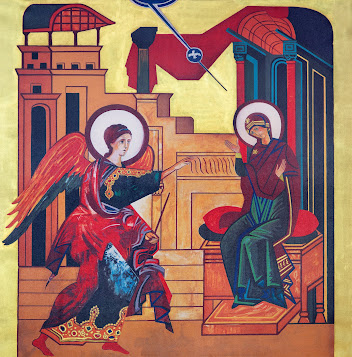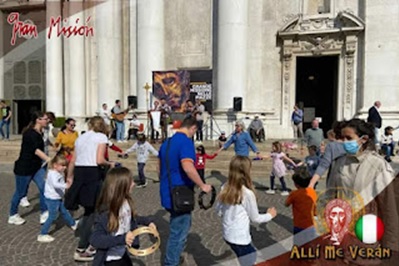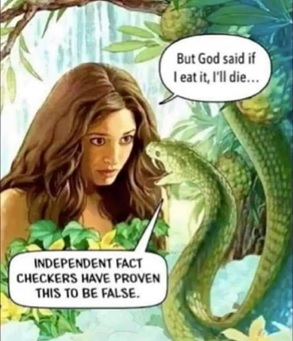Beware of false prophets, who come to you in sheep's clothing but inwardly are ravenous wolves. You will know them by their fruits. Are grapes gathered from thorns, or figs from thistles?
Matthew 7:15-16
Advocates and followers of the Neocatechumenal Way will frequently tell you to look at their fruits. Citing the Gospel of Matthew, they will tell you that all their good fruit is proof of their God-given charism, and thus they are above reproach. "Judge us by our fruits," is an oft-repeated retort to just about any criticism.
But what are the specific fruits they want you to recognize and judge? Archbishop Samuel Aquila of Denver phrases it well:
Precisely through inviting people to encounter Jesus and by accompanying them in the communities and steps of the Way, an abundant harvest is found in our parishes. People come to know the vine, Jesus Christ, abide in him by putting their faith in him as he transforms their lives, and then they bear much fruit as they go out to invite others to come to know Jesus.... The Way has demonstrated by its fruit that it is of the Holy Spirit.
In a private letter, he goes on to say: "I have heard the testimonies of many of those in the Way who have had an authentic encounter with the Lord through a radical conversion from their former way of life. Such conversion cannot--and should not--be made up, but must only come from the grace of God."
It all sounds very simple. The Way boasts impressive numbers of converts--that is, people who have encountered Christ in a meaningful way, or at the very least, people who have joined the movement. They also boast impressive numbers of missionaries--individuals and families who travel near and far to spread the Gospel. Finally, they boast an impressive number of vocations--young men from Neocatechumenal communities around the world entering seminary and becoming ordained priests in an often vocation-starved world.
But is this enough?
The Neocatechumenal Way is fraught with deviant theology, abuse of power, corruption, and all manner of sordid baggage. The frequency of the use of "judge us by our fruits" would seem to indicate a hope that the ends will justify the means. In other words, "as long as our results are good, does it really matter how they were achieved?" This is an obvious fallacy and an especially devious deflection, assuming the one using it knows better. But as unscrupulous a tactic as this may be, the real heart of the issue lies deeper.
Conversion is, for better or worse, a pretty subjective thing. If you claim that you've had an authentic encounter with Christ, it really isn't my place--or anyone else's--to retort with "no you haven't." Your demeanor, your lifestyle, and especially your choice of words and actions might raise some serious questions or doubts, but that's not the same as outright denial. Conversion and relationship with Christ is an intensely personal experience. So, if, as Archbishop Aquila says, many in the Way have experienced these radical conversions, we owe it to them to take their claims seriously and celebrate the Good Shepherd finding his wayward sheep.
Unfortunately, the Catholic Church does not possess a monopoly on conversion claims. Joel Osteen's Lakewood Church in Houston, Texas, for instance, has a weekly attendance of upwards of 40,000 people. Men like Gerald and Julio are just two specific stories of transformation and conversion in that church. If every single one of those 40,000 congregants has a similar story, those are some amazing figures of men and women coming to Christ.
In terms of missionaries, the Church of Jesus Christ of Latter Day Saints runs circles around the rest of the world. One source estimates that between 80 and 90% of young men from practicing LDS families go on mission. Few have the missionary fervor of spreading the Good News of Jesus Christ* like the Mormons.
While priestly vocations are a uniquely Catholic thing, consider that ex-Cardinal Theodore McCarrick also had a glowing reputation for producing vocations. Author and former New Jersey seminarian Dr. John DeFilippis recounts:
As bishop of Metuchen, McCarrick earned a reputation for ordaining anyone with "a penis and a pulse." He ordained men who had psychological issues, substance abuse issues, and a host of other problems. For him it was all about the numbers, and it was the sheer quantity of vocations he brought into the Church that helped catapult him to the seat in Newark.
Once in Newark, McCarrick continued the same strategy. Not only did he ordain men who had issues that made their candidacy for the priesthood questionable at best, he also recruited seminarians from foreign countries who barely spoke English. He even welcomed the Neocatechumenal Way to Newark with open arms and established another seminary just for them. Soon he was ordaining more seminarians to the priesthood than any other diocese in the country.
Were good, saintly priests also ordained as a result of McCarrick's long recruitment campaigns? Undoubtedly; just as good, saintly priests likely also come from the Way's Redemptoris Mater seminaries. But that is not the point. The priesthood is not a numbers game. Numbers alone are meaningless if the quality of those numbers is deficient. Ten good, saintly priests are infinitely more valuable than a thousand bad priests.
Returning to the not-uniquely Catholic phenomenon of conversion for a moment, there are even many people in the world--including members of my own family--whose conversion, whose encounter with Christ led them away from the Catholic Church! How many otherwise wonderful, faithful people in our world today are lapsed Catholics? How many of Joel Osteen's tens of thousands would identify themselves as "recovering Catholics"?
So you see, conversion is not enough. Missionary fervor is not enough. Studying for and being ordained to the priesthood is not enough. Numbers are not enough. Protestants, Evangelicals, other self-identified Christians, Unitarians--to say nothing of other religions, spiritualities, pseudo-sciences, and other movements--all can boast of "transformed lives," "missionary zeal," and "leadership vocations" in equally high, if not higher numbers than the Neocatechumenal Way.
The difference lies in the Catholic Church.
I love conversion stories. The saints, obviously, have some of the best: Augustine, Francis of Assis, Ignatius Loyola, Edmund Campion, John Henry Newman, Elizabeth Ann Seton, Kateri Tekakwitha, and Josephine Bakhita, just to name a few. Thomas Merton and Dorothy Day may or may not ever be canonized saints, but they also have great stories. In our own day, Scott Hahn and Fr. Donald Calloway are two well-known converts. The recent Mark Wahlberg film Father Stu highlights the amazing journey of Father Stuart Long. Even Hollywood star Shia LaBeouf recently crossed the Tiber, giving kudos to Padre Pio and the Traditional Latin Mass for helping him along.
The reason we celebrate these men and women and continue to pray fervently for people like Joel Osteen and his congregation, or my Evangelical relatives is that we believe that the fullness of truth and salvation lies within the Catholic Church. Those that come to Christ outside the Church have overcome a great hurdle--belief in Christ and acceptance of Christ is much better (and much harder!) than the alternative. Contrary to the Neocatechumenal brother who once told me that my claims against the Way, if true, would make him a "spiritual abortion," every man, woman, and child who comes to know our Blessed Lord is a tremendous blessing. But that doesn't mean you're finished.
Indifferentism is a condemned heresy in the Catholic Church. Pope Gregory XVI explains it this way:
This perverse opinion is spread on all sides by the fraud of the wicked man who claims that it is possible to obtain the eternal salvation of the soul by the profession of any kind of religion, as long as morality is maintained.... With the admonition of the apostle that "there is one God, one faith, one baptism" may those fear who contrive the notion that the safe harbor of salvation is open to persons of any religion whatever. They should consider the testimony of Christ Himself that "those who are not with Christ are against Him," and that they disperse unhappily who do not gather with Him. Therefore "without a doubt, they will perish forever unless they hold the Catholic faith whole and inviolate."
Mirari Vos, paragraph 13
Or, as another priest put it more succinctly, "The heresy of indifferentism is the notion that all world religions have an equal chance at getting someone to heaven."
Extra ecclesiam nulla salus. No one who consciously and obstinately rejects the teachings and doctrines of Holy Mother Church can be saved, for they knowingly and willingly--of their own free accord--reject the means of that same salvation. This is why conversion on its own, and numbers on their own, are not sufficient proof of charism.
When Archbishop Aquila and others celebrate people coming to Christ irrespective of the uniqueness of the Catholic faith and the Catholic Church and then declare it to be a genuine fruit of the Holy Spirit, what can we call this but a soft indifferentism?
Surely by that logic, the Holy Spirit blesses Joel Osteen and his congregation of tens of thousands, and they will be saved. The Holy Spirit blesses the eager young Mormon men on my front porch, and they will be saved. The Holy Spirit blesses Ted McCarrick and his hordes of terrible priests, and they will be saved. The Holy Spirit blesses my Evangelical relatives--and all their cursing of the evils and blasphemies of the Catholic Church--and they will be saved. And by the same logic, what difference does it make, and why bother celebrating if a John Henry Newman or a Scott Hahn becomes Catholic? They were both ardent Protestant clergymen--surely that was good enough! What difference does it make if Thomas Merton took an eastward turn in his later life--surely that can't be a dealbreaker!
Archbishop Aquila and other like-minded souls likely take for granted the Neocatechumenal Way's canonical status as "Catholic." But, as Bishop Athanasius Schneider once said:
The Neocatechumenate is a Protestant-Jewish community inside the Church with a Catholic decoration only.... They reject the idea and teaching of the Eucharist as a true sacrifice. They even hold that the traditional teaching of, and belief in, the Eucharist as a sacrifice is not Christian but pagan. This is completely absurd.
To my dear brothers and sisters in the Way, and to all those who support the Way: do not be taken in by soft indifferentism, being impressed by numbers, moving stories, and harrowing accounts of conversion. Trust in the depositum fidei of Holy Mother Church and reject outright anything else, for "if any man teach otherwise, and consent not to the sound words of our Lord Jesus Christ, and to that doctrine which is according to godliness, he is proud, knowing nothing" (1 Tm 6:3-4).
The Neocatechumenal Way produces conversions, but also deep divisions. They produce missionaries, but of a deformed Gospel. They produce priests, yet they deny the propitious sacrifice of the Eucharist those priests stand in persona Christi to offer.
Beware of false prophets, who come to you in sheep's clothing but inwardly are ravenous wolves. You will know them by their fruits.









.jpeg)




